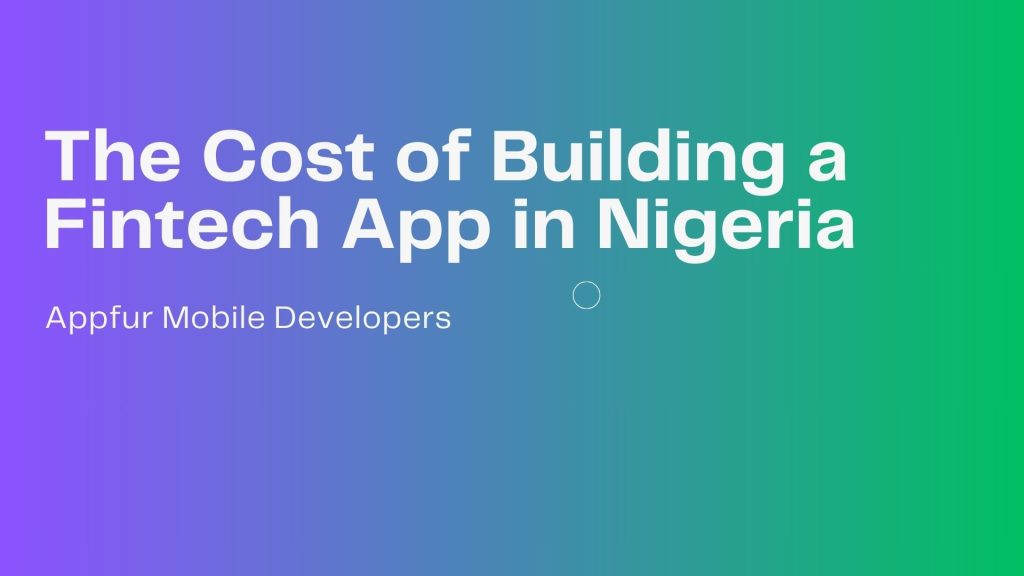Did you know that Nigeria is home to over 200 active fintech startups and that the fintech sector has attracted more than $1.37 billion in investment between 2019 and 2021 alone? From mobile wallets to lending platforms and digital banks, fintech is fueling Nigeria’s transition to a cashless economy.
If you’re considering launching your own fintech app in Nigeria, one of your biggest questions is likely: How much will it cost to build a fintech app?
In this guide, we’ll break down what drives development costs, what to expect at each stage, and how to make cost-effective choices without sacrificing quality.

1. What Kind of Fintech App Are You Building?
The type of fintech app you build determines the complexity, required features, and overall cost. A simple mobile wallet app will be less expensive than a full-scale digital banking platform. Popular fintech app categories in Nigeria include:
- Payment wallet apps (like Opay or PalmPay)
- Peer-to-peer lending platforms
- Digital banks (like Kuda)
- Crypto trading platforms
- Micro-savings and investment apps (like Cowrywise or PiggyVest)
- Buy Now, Pay Later (BNPL) platforms
- Agency banking networks
Each of these app types has different compliance needs, feature sets, and user journeys, all of which influence the cost.
2. Core Features That Influence Cost
Most fintech apps must include secure, well-integrated features that users trust. These core features typically include:
- User onboarding and KYC: Fintech apps must verify users using identity verification APIs such as Smile Identity or VerifyMe. These third-party services come with additional integration costs.
- Account or wallet management: Users expect to send and receive money, view balances, and manage transactions easily. This functionality requires a strong backend structure and security protocols.
- Payment gateway integrations: To move money in and out, your app will likely need integrations with platforms like Paystack, Flutterwave, Mono, or direct bank APIs.
- Transaction history and notifications: Users need to receive updates about transactions in real time, which requires event tracking systems and notification APIs.
- Security measures: Multi-factor authentication, biometric login, encrypted storage, and fraud prevention systems all add to the cost but are critical in the fintech space.
3. The Importance of UI/UX Design
Good design directly affects trust and usability in fintech apps. Nigerian users have high expectations due to exposure to apps like Kuda and Opay, which offer sleek and intuitive designs.
Design costs include user flow planning, wireframing, interface design, and responsiveness across devices. A quality fintech app requires thoughtful design not only for aesthetics but for customer confidence and retention.
4. Security and Compliance Considerations
In Nigeria, fintech apps must comply with regulations from the Central Bank of Nigeria (CBN) and data protection guidelines under the NDPR (Nigeria Data Protection Regulation). You may also need PCI DSS compliance if handling card payments.
Security infrastructure often includes:
- Encrypted databases
- Audit logging
- Role-based access control
- Secure API connections
- Routine penetration testing
These systems are not optional in fintech—they are essential for building trust and avoiding legal issues. Implementing them increases the project cost but is well worth the investment.
5. Who Builds the App Matters
The cost of building a fintech app varies significantly depending on who you hire to develop it:
- Freelancers offer the lowest upfront costs but come with risks like inconsistent delivery, poor code quality, or lack of post-launch support.
- In-house teams can be efficient if you already have technical leadership, but hiring and retaining a strong team can be costly in the long run.
- Local agencies like Appfur provide a balance between quality, cost, and local expertise. Agencies are especially valuable if you need end-to-end support—from ideation to launch and beyond.
- International agencies can offer high-quality solutions, but their rates often far exceed the local market. They’re best suited for enterprises with global ambitions and significant funding.
6. Post-Launch Maintenance Costs
Building the app is just the beginning. You’ll also need to budget for maintenance, upgrades, user support, and marketing.
Some post-launch costs include:
- Cloud hosting and server management
- Monitoring tools and performance optimization
- SMS and email notification systems
- Customer support integrations (chatbots, ticketing, etc.)
- Marketing and growth campaigns
To ensure your app stays secure, bug-free, and scalable, it’s wise to allocate a monthly or quarterly budget for ongoing improvements and support.
7. Budget Range: What Should You Expect to Spend?
Here’s a rough breakdown of what to budget depending on the scope of your app:
- MVP (Minimum Viable Product): ₦10 million to ₦20 million
- Fully-featured fintech app: ₦25 million to ₦50 million
- Enterprise-grade solution: ₦50 million and above
These estimates include design, development, security, testing, and initial launch support. Keep in mind that licensing, compliance, and infrastructure costs can also increase your total spend.
Final Thoughts
Building a fintech app in Nigeria is a significant but worthwhile investment. The fintech space is growing rapidly, and with the right strategy, your app can reach millions of users. However, success requires more than just coding—it requires proper planning, compliance, excellent user experience, and long-term support.
At Appfur, we specialize in building secure, scalable fintech apps tailored to the Nigerian market. Whether you’re launching a new wallet app, digital lending platform, or embedded finance product, we can help you every step of the way.
Ready to build your fintech app?
Let’s make it happen. Visit www.appfur.com.ng or reach out for a free consultation.
We design and build high-quality, scalable mobile apps tailored to your needs.
Let’s talk! Message us on WhatsApp now: Click Here
Your next big app starts here!
